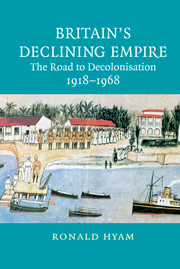Book contents
- Frontmatter
- Contents
- List of illustrations
- Maps
- Preface
- List of abbreviations
- Introduction
- 1 ‘The whole world is rocking’: British governments and a dysfunctional imperial system, 1918–1945
- 2 ‘British imperialism is dead’: the Attlee government and the end of empire, 1945–1951
- 3 ‘Rugged and tangled difficulties’: the Churchill and Eden governments and the end of empire, 1951–1956
- 4 ‘The wind of change is blowing’: the Macmillan and Douglas-Home governments and the end of empire,1957–1964
- 5 'We could no longer afford to honour our pledges': the Wilson government and the end of empire, 1964–1968
- Epilogue
- Appendix
- Select bibliography
- Index
5 - 'We could no longer afford to honour our pledges': the Wilson government and the end of empire, 1964–1968
Published online by Cambridge University Press: 05 June 2014
- Frontmatter
- Contents
- List of illustrations
- Maps
- Preface
- List of abbreviations
- Introduction
- 1 ‘The whole world is rocking’: British governments and a dysfunctional imperial system, 1918–1945
- 2 ‘British imperialism is dead’: the Attlee government and the end of empire, 1945–1951
- 3 ‘Rugged and tangled difficulties’: the Churchill and Eden governments and the end of empire, 1951–1956
- 4 ‘The wind of change is blowing’: the Macmillan and Douglas-Home governments and the end of empire,1957–1964
- 5 'We could no longer afford to honour our pledges': the Wilson government and the end of empire, 1964–1968
- Epilogue
- Appendix
- Select bibliography
- Index
Summary
‘Great Britain has lost an empire and has not yet found a role’; a role based on the Commonwealth ‘is about played out’. These blunt and undiplomatic words of Dean Acheson, the respected retired American secretary of state (1949–53), in 1962 were received mournfully and by some officials as simply untrue. Empire might be having an euthanasian death, but, as if by way of compensation,Britainwas in fact trying to make theCommonwealth work and giving its continuing international role a blood transfusion, clinging desperately to the remnants of its great-power status. Just as in the 1930s a declining position in the Far East had led to a fixation with the Singapore naval base, so nowin the 1960s the loss of formal empire led psychologically to the obstinate promotion of an Indian Ocean role and a reluctance to let go of ‘informal empire’ East-of-Suez. As a result, defence and decolonization in the mid-1960s were in a dysfunctional relationship. Defence arrangements were escalating and not co-ordinated with the time-tables and consequences of decolonisation. Defence plans were also increasingly out of step with what could be afforded. The underlying problem, as always, was the mismatch between actual resources and supposed requirements. Christopher Mayhew, resigning as minister for the navy, in 1966 likened British defence to a Hindu cow: it was neither fed properly nor put out of its misery. This had come about as much through defects of perception as poor economic performance.
- Type
- Chapter
- Information
- Britain's Declining EmpireThe Road to Decolonisation, 1918–1968, pp. 327 - 397Publisher: Cambridge University PressPrint publication year: 2007



